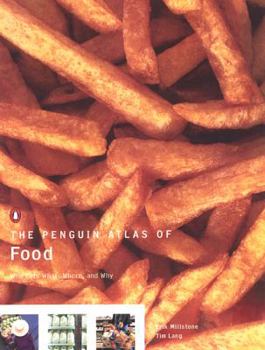The Penguin Atlas of Food: Who Eats What, Where, and Why
Select Format
Select Condition 
Book Overview
From the excessive use of grain to satisfy meat-eating demands to the safety of new food technologies, The Penguin Atlas of Food utilizes ninety-six pages of maps and graphics to show how the food... This description may be from another edition of this product.
Format:Paperback
Language:English
ISBN:0142002240
ISBN13:9780142002247
Release Date:March 2003
Publisher:Penguin Group
Length:128 Pages
Weight:0.82 lbs.
Dimensions:0.4" x 7.4" x 9.8"
Age Range:18 years and up
Grade Range:Postsecondary and higher
Customer Reviews
3 ratings
The Penguin Atlas of Food: Who Eats What, Where. and Why
Published by Thriftbooks.com User , 17 years ago
It is a very good book, in very good condition and the service couldn't have been better.Thank you so much
simple and direct on food and agriculture
Published by Thriftbooks.com User , 18 years ago
The Atlas of food is not a cookbook but a cursory view of food and agriculture around the world in 100 pages or so. Rich of tables, charts and histograms of different shapes and colors, it provides a basic knowledge on food industry. The book is divided into five parts: Contemporary Challenges (population and productivity, environment, consuming diseases, over and under-nutrition in the world, and food aid); Farming (mechanization, animal feed, genetic modification, pesticides, fishing, biodiversity and sustainable farming); Trade (flows, animal transport, food miles, subsidies, trade disputes, fair trade); Processing, Retailing and Consumption (staple foods, processing giants, probiotics and cholesterol lowering food, organic food, fast food, food additives, eating out and alcohol); and world tables on agriculture and consumption. If you want to know the state of the world of under-nutrition and over-nutrition, or that the amount of grain needed to feed one person for one year on a meat-based diet is 930 kg or on a grain-based diet is 180 kg and many more questions answered, then this is the book. Very good for students and general readers. However, if instead you want to have a deeper look at food and agriculture and related issues then visit the website of the Food and Agriculture Organization of the United Nations (...).
Very Informative
Published by Thriftbooks.com User , 19 years ago
As industrialization and technology take over our lives, we become more sedentary. Through the riches of our country, we can afford more meat, dairy products and processed foods; thus, contributing to our poor health, "over-nutrition", otherwise known as the Western Diet. Erik Millstone works at the University of Sussex in Science Policy. He has been working on food-related issues for almost 30 years. Tim Lang is a professor of food policy at City University in London. He is, also, a consultant to the World Health Organization. With the aid of Axel Drescher, a professor of Applied Geography at Freiburg University, they have formulated this educational book about "who eats what, where and why". While rich industrialized countries thrive in excess and develop diseases from over-consumption (such as, diabetes), these countries are also feeding a bulk of our grain to feed livestock, when over 40 million people a year die of starvation. This book is filled with statistics, bar graphs, charts and miscellaneous graphics that help aid in our understanding of food's role in modern life. The book is divided into five parts: Contemporary Challenges (feeding the population, environmental challenges, disease, nutrition and more); Farming (mechanization, genetic modification, pesticides, sustainable farming and more); Trade (animal transport, fair trade, tariffs and more); Processing, Retailing and Consumption (staple foods, Organic food, fast food, alcohol and more); and World Tables (agriculture and comsumption). This is not a cookbook, nor a glamorous journey through each country's cuisine, however. Upon studying this book, I ponder the ideas of vegetarianism for a healthier way of life, and as an objection towards the feeding of livestock in lieu of providing grain for starving nations. I, also, think of how we have looked for ways on simplifying our lives with remote controls, garage door openers, email, kitchen appliances, washers and dryers, and how ultimately, we have complicated it more. This reminds me of a movie I once saw: The Gods Must Be Crazy. Although this movie takes on a more comedic approach of two wildly different cultures in South Africa, still it does demonstrate what both cultures have gained and lost due to industrialization. Information found in this book can help educate the reader on how the food on their plate came to be and at what cost to society. For anyone that eats, and that is everyone, we should all read this book and become more educated on how we are contributing, both positively and negatively, to our society.




